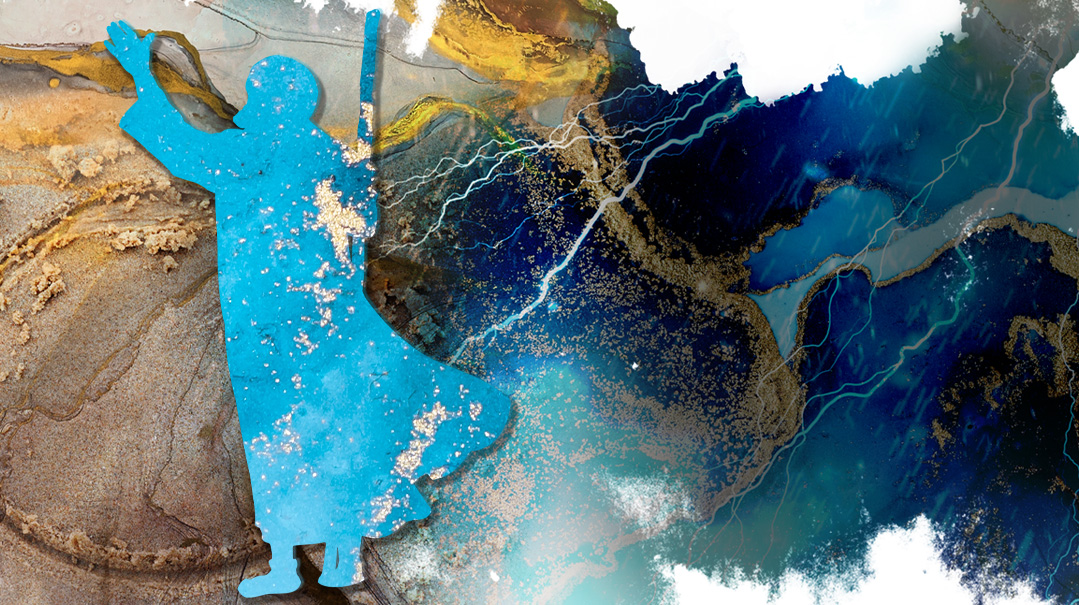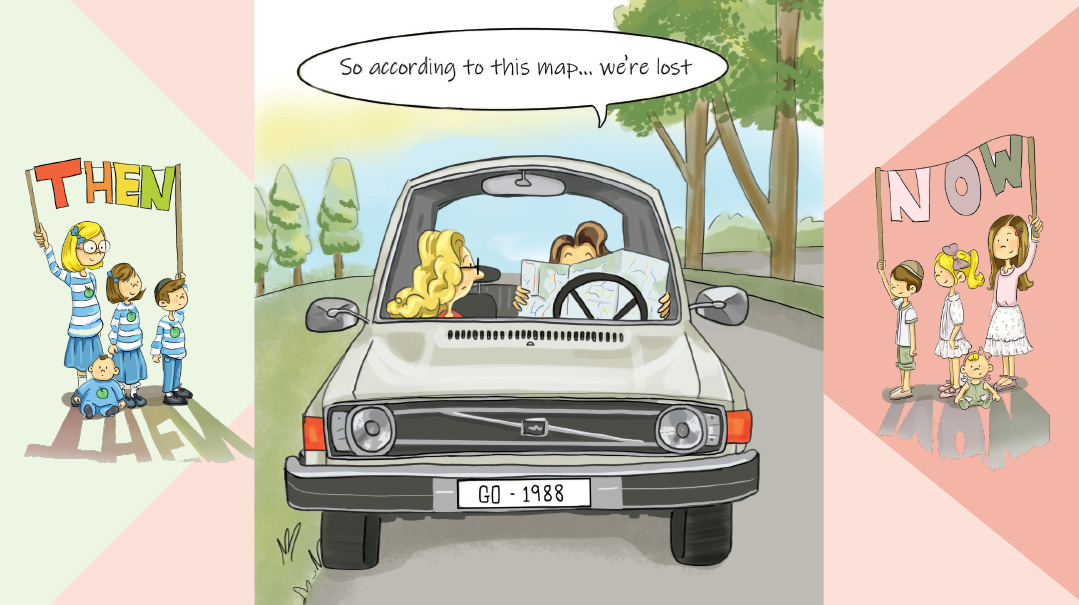Circle of Faith
| October 6, 2022The story of Choni Hame’agel, who stepped up on behalf of a desperate nation to plead for the waters they needed

Bright rays of sunlight flooded the darkened room, stirring the dust mites into a swirling dance.
Uriah opened his eyes. “Oh, no,” he groaned, his eyes blinded by the light shining through the window. “When will we finally wake up to a gray, cloudy morning?”
He stood up and scanned the clear sky.
“Not a single cloud?” he cried out, raising his eyes to the heavens. “The cisterns are empty, and the people are thirsty. How much longer will we have to wait for rainfall?”
Uriah dressed quickly and stood at the entrance to his house. He waved to his neighbor Shimon, who was shouldering his hoe.
“Are you heading out to the fields?” asked Shimon, wiping the sweat from his brow. “If we don’t hurry, we’ll have to work under the blazing sun.”
“No, I’m staying home today,” Uriah replied, the words catching in his dry throat. “For three years now, I’ve worked my fields, plowed, sowed, and waited for the rain to come…. Three years of drought and famine, and I continue walking over the rocky soil, my tears watering the hard clods of earth. Why should I work when the skies remain sealed?”
“You’re right,” Shimon replied. “It’s already the 20th of Adar, and winter is nowhere on the horizon. If rain doesn’t come, the water in the cisterns will run out, and we’ll all die of thirst.”
He spurred his donkey and began walking away.
“Stop, Shimon!” Uriah cried. “You said that we’ll all die of thirst, sealing our people’s fate with a wave of your hand. You kill men, women, and children with your words, condemning us all to a death worse than by the sword, and that’s it? You just continue with your day?”
Shimon froze. After a long pause, he turned around and fixed Uriah with a penetrating stare. “And what are you doing? Is choosing to stay home and despair not also admitting defeat? Is that not how droughts wear down the living?”
“So, what do you suggest we do?” Uriah retorted, his cheeks reddening from the sharp reproach. “We are Jews, believers and sons of believers. We know that drought comes from the sin of failing in shemiras einayim. We must have fallen to this sin, and the time for forgiveness has not arrived.”
Shimon thought a minute. “We must turn to Choni,” he decided. “Choni is humble and G-d-fearing, and his spiritual level is so high that whenever he approaches the Azarah of the Beis Hamikdash, it fills with light. He is wise, and his words are received pleasantly. Let’s go to him. Maybe he can daven that Am Yisrael be saved.”
“Good idea,” Uriah said. Together, they headed out to the home of Choni, the gadol hador.
“It seems we aren’t the only ones turning to Choni in our distress,” Shimon remarked, gesturing at the crowd clustered around the entrance to the house. “The people are thirsty and long for a trusty envoy to revoke G-d’s doom.”
Uriah scanned the crowd. The rich stood shoulder to shoulder with the poor, Kohanim standing with Yisraelim.
The drought has broken down inequalities and class differences, he reflected. Everyone feels the drought.
The sound of a door creaking on its hinges made Uriah look up at the tzaddik’s home.
“Rabbosai, I’ve presented your request to Choni,” the gadol’s meshamesh declared. “I’m glad to bring you the news that Choni has abandoned his learning seder to daven for rainfall. Remember what it says in the Shema: When Bnei Yisrael need rain, Hashem promised to listen to the one who learns Torah. Choni has labored over the Torah, and no one is more fit to plead for rain on our behalf.”
A wave of excitement stirred the crowd. A tzaddik’s prayer is not something to be taken lightly. Surely Hashem would hear Choni’s prayer and hurry to shower life-giving dew upon the earth.
“Let’s stay here and wait for salvation,” Shimon suggested. “I rely on the tzaddik’s prayer.”
“Good idea,” agreed Uriah. The two retired into a corner and waited patiently for the heavens to open.
An hour went by, then two, then more. Soon it became dusk, but there was still no sign of rain.
Was it possible that the tzaddik’s prayer was being rejected?
“Maybe tomorrow we’ll awaken to fresh breezes bringing rain clouds,” the crowd hoped as they turned away to retire for the night. But morning arrived, and with it the heat and the dust. The despairing people knocked on Choni’s door and pleaded for help.
“Choni! Save us!” they cried. “If your prayers go unanswered, who will answer us?”
“He Who answered Avraham Avinu will answer you,” Choni responded. “Yesterday I sent up my prayers for rain, but it seems I’m not worthy enough for rain to come for my sake.”
“If you’re unworthy, how will we be found worthy?” the people wondered. “You’re the greatest among us. We’re simple people.”
“Maybe each of you individually has not reached high levels,” replied Choni, “but together you have a power far greater than mine.”
“What do you mean?”
“I’m talking about the power of the tzibbur!” Choni cried, sweeping the crowd with his gaze. “The power of a leader comes from the people. If you appoint me as your envoy, I can work great miracles.
“The key to rainfall is in Hashem’s hands, and my own efforts have not succeeded in opening the gates,” Choni continued. “Support me and stand behind me, and I’ll approach the King of Kings in humility, knowing that I’m not relying solely on my own righteousness but on the power of the tzibbur.”
“Go, Choni, be our voice and our advocate,” the people cried. “We trust in you and your strength, and therefore it’s your right to lead the people. Go with this strength and save Am Yisrael.”
Choni nodded and walked toward the center of the courtyard, the crowd parting before him.
“I have no choice but to act as Chavakuk Hanavi did,” Choni whispered to himself. “I will be moser nefesh for the people.”
He scanned the ground, noticed a tree branch, and picked it up. The crowd watched curiously as he bent down and pushed the end of the stick into the ground, then began dragging it, digging a deep, circular furrow in the ground.
“Look,” the people called. “Choni is drawing a circle and standing within it to separate himself from the generation and from its sins, because we aren’t worthy of a great miracle.”
“I am standing inside a circle that looks like a pit,” Choni said. “I pray that my tefillos will be heard as if they came from the depths.”
“But why did you draw it in the shape of circle?” Shimon pressed. “I’m sure there’s a reason behind that.”
“There are indeed many reasons behind it,” Choni replied. “The line I drew in the ground will serve as a demarcation line between us, and it’s a circle to invoke the wheel of fate and remind us all that Am Yisrael is above fate. I’ve heard the gentiles who worship the stars saying that Israel is subject to fate, and this is a great chillul Hashem. I pray that today everyone will witness the miracle and know that the fate of Israel is purely in the hands of Shamayim.”
Choni stood up straight in the center of the circle and turned to the crowd surrounding him: “I am going to plead for mercy from the One Who owns mercy,” he said, throwing aside the branch. “We have learned from Rabi Elazar that even in Hashem’s anger, He is still merciful.”
He raised his eyes to the Heavens and began pleading to his Creator: “Ribbono shel Olam! Your children have turned their faces to me and requested that I turn to You in prayer and supplication. I’ve agreed to take on this mission because I am afraid that I am to blame for their sins, since I did not reproach them sufficiently. And now, I swear by Your great name that I shall not move from here until You have mercy on Your sons.”
Silence fell on the crowd.
“What’s this? What is Choni doing?” Shimon asked, stunned. “How can he take an oath about something that may not happen? That would be swearing in vain.”
“Shhh,” Uriah hushed him. “Did you not notice that Choni chose his words carefully. He said ‘Your sons.’ ”
“And what does that mean?”
“Don’t you remember what Rabi Meir said? He said that no matter what, Am Yisrael are the children of Hashem. And because we are ‘banim la’Hashem,’ he is pleading that Hashem show His mercy to His children.”
Uriah and Shimon turned back to look at Choni, whose eyes were fixed on the heavens. Suddenly, miraculously, a light drizzle began.
“It’s raining!”
“Choni’s prayers have been answered!”
“This is not rain, just a few drops!” someone else retorted. “Don’t you see what happened? Hashem didn’t want Choni to take an oath in vain, so He gave us a few drops. The rain is falling to free him from his oath, but it’s not the rain we need.”
Choni nodded in agreement. “There’s truth in what you say. I prayed at first because I felt obligated to do so, since the nation requested my prayers, and not from a sense of humility. That’s why my request wasn’t immediately granted. Now I’ll ask for rains of blessing.”
Again Choni raised his head to the Heavens. He called out: “This is not what I asked for. Please send rains to fill the cisterns, pits, and caverns. Real rains to stop the terrible drought.”
At once the sky filled with clouds, and enormous raindrops, each big enough to fill a barrel, began falling.
“What a downpour!” the people cried. “Not one drop is smaller than a log!”
“This is not rain, it’s a deluge!” The people rushed for shelter. “This is unnatural rain, like the rain that fell during the Mabul. It’s going to destroy the world, and we’ll all die!”
But then the voice of Choni, who was standing upright under the torrent, was heard crying: “Ribbono shel Olam, this isn’t what I asked for. Please send rains of ratzon, blessing, and generosity.”
At once the violent torrent stopped and mild rains began falling.
“Choni, Hashem has granted your prayer,” the Jews exulted. They watched with delight as the wells filled, and new life started flowing in the rivers and gurgling in the springs. “Isn’t it amazing to see how Hashem loves the talmidei chachamim? He fulfills whatever they ask!”
“Yes,” said Uriah. His feet splashed in the rainwater accumulating on the ground, “It gives me great chizuk in my faith that Moshe is true and his Torah is true. If Choni Hame’agel, who is a distant descendant of Moshe is so great, think how great Moshe must have been.”
Shimon and Uriah left Choni’s house, happy that Hashem had heard their call.
“Tell me, Uriah,” Shimon said, “why did we suffer that drought?”
“The skies closed so that Am Yisrael would turn their hearts to Shamayim, begging Hashem to provide food,” replied Uriah. “Just like the Imahos. Hashem closed their wombs, preventing them from having children, so that they would daven to Him.”
“True,” Shimon agreed. “And we have learned that Hashem hid the grass under the ground at the time of Creation. He was waiting for Adam to pray for the plants to bloom. I see that even when Hashem is ready to bring good to the world, He waits for our tefillos before doing so.”
“Amazing!” Uriah smiled and let the rain wash down his face. “I also heard from chachmei hador that last Rosh Hashanah it was decreed that rains would fall in Eretz Yisrael, but they were held up because HaKadosh Baruch Hu craves the prayer of the tzaddikim. The whole inyan of tefillah is to make the potential real, they said. Now the tzaddik Choni has davened, and rain is falling. I am sure that Hashem is happy with us, for there is no greater day than one on which rain falls!”
“Hashem is happy in our happiness anyway,” Shimon corrected him with a smile. “Hashem wants to shower only blessings and goodness on us, and when we’re able to overcome challenges, no one is happier than our G-d.”
A fresh breeze blew between the mountains, breathing new life into the suffering creation.
The earth, which had been cracked and parched, happily drank up the rains of blessing.
As the masses returned to their homes, deeply moved by the miracle they had witnessed, an urgent messenger left from the Lishkas Hagazis to Choni Hame’agel’s house.
“Choni,” the messenger cried, “I bear an urgent message from the Lishkas Hagazis.”
“And why did the chachamim trouble themselves to send me a message?” Choni wondered. “Did a question arise at the Beis Din?”
“No question, but a harsh reproach,” replied the messenger. “Word of your deed and the circle you drew came to the beis din, and the chachamim are displeased with you.”
“Why?” Choni demanded. “The skies were closed, there was no rain, and the crowd pleaded with one voice.”
“Yes, but your actions were not done properly,” the messenger explained. “Shimon ben Shetach told me to tell you that, ‘If you were not Choni, whom everyone knows to be a great man, I would have no choice but to excommunicate you.’ ”
“Excommunicate?” Choni’s eyes opened in wonder. “To that extent?”
“Absolutely,” the messenger nodded weightily. “Beis din pronounces nidui on 24 occasions, including on one who disrespects a rav, on one who scorns netilas yadayim, on one who disrespects talmidei chachamim who are no longer living, and one who disrespects G-d’s name. You were guilty of the latter, for you hurled angry words at the Heavens.
“How could you dare swear that you wouldn’t move until rain fell?” the messenger continued. “For every child knows that no one but Hashem Himself controls the rain.
“Think about what you did, Choni. What would have happened if your request was refused? Have you forgotten how serious the sin of swearing in vain is? And more: You would have caused a chillul Hashem! You know that anyone who leads the masses into chillul Sheim Shamayim is subject to nidui. And not only that, but because of you, Am Yisrael would have said that there’s nothing in an oath.”
“I know that it’s forbidden to take an oath,” Choni replied. “But I didn’t act on my own authority. I followed in the ways of Chavakuk Hanavi, who was moser nefesh for Am Yisrael. Chavakuk taught us that when a Jew rises to the level of a tzaddik or prophet, and he sees that his oath is both necessary and will elevate Hashem’s name, he is permitted to swear by Hashem’s name.”
“I hear you, but you still acted inappropriately,” insisted the messenger. “Did you compare yourself in your mind to Eliyahu Hanavi, who received the key to rain from Hashem and swore that no rain would fall? And besides, how did you dare trouble HaKadosh Baruch Hu again and again, for one type of rain after another?
“You know, Choni, you should have been punished as the son of Rabi Yossi, who is from Yokrat. One day he went out into the field and saw that his father was late in bringing lunch to his workers. The son sat under a fig tree and said: ‘Fig, fig, bring forth your fruit so that Abba’s laborers may eat.’
“The fig tree produced its fruit, and the workers ate and were satiated. But when Rabi Yossi returned, he said to his son: ‘My son, you troubled your G-d to cause a fig tree to produce fruit before its time. As a punishment, you, too, will die and be gathered to your fathers before your time.’ ”
“If it’s true that I deserve this doom, why did Shimon ben Shetach not put me in cherem?” inquired Choni. “Why is he content only with sending reproaches through a messenger?”
“Because you have ingratiated yourself to Hashem, and He has granted your request,” the beis din’s emissary replied, smiling. “You are like a son who makes his father happy and then asks for something special. And the father does what his son wants. You decreed from below, and HaKadosh Baruch Hu upholds your orders from Above. Through your tefillos, you saved the generation.”
Uriah and Shimon arrived at their homes, still marveling at the rainfall. Hours went by, and the rain did not stop. Slowly, the water level climbed, and the low-lying areas of the town became flooded.
“The rivers are overflowing!” the panicked residents cried. “The rain that began as a blessing has become a curse!”
“Quick, head to Har Habayis!” men cried to each other. “It is high, and the waters have not yet flooded it! We can hide in the covered area between the Temple Mount wall and the buildings of the Beis Hamikdash!”
“Run for the stav!” the men urged their families. “It is a very large area surrounding the Beis Hamikdash, and it’s covered with a roof! We’ll run back to Choni and ask him to stop the rain!”
A long procession of Jews, loaded with whatever movables they could save from the flooding, wended toward Har Habayis, while representatives of the people rushed through the pouring rain to Choni’s house.
“Choni! The people are taking shelter on Har Habayis,” they cried anxiously. “Please, just as you prayed for the rain to fall, pray now for it to stop. Please, go out and entreat the One Who makes the winds blow and the rains fall to stop the torrent.”
Choni heard their request, but he shook his head in refusal: “I cannot ask for the rains to stop, for I have learned that one cannot daven to stop an excess of good. I can’t ask Hashem to stop the plenty He’s sending to the world!”
“But we’ll die from all this good!” cried the Jews. “What should we do?”
“Go out to the Even Hato’in in Jerusalem,” Choni said. “Check whether the water has climbed above its height.”
“Choni, do you mean the stone at which lost-and-found objects are declared?” cried Shimon, trying to make himself heard above the crashing rain. “Why should we go to the Even Hato’in?”
“A good question. We are taught that drought comes because of the sin of theft. The Even Hato’in, the place of hashavas aveidah, symbolizes the opposite of theft. I am sending you there to repent of the sin of theft. Let me know if the stone has been swamped and carried away by the rain.”
“There’s no need to check,” someone called. “It’s a large, strong stone. It won’t be shaken by the rain.”
“Now you will understand that just as it is impossible for this stone to be wiped out of the world, it is impossible to daven for the rain to stop,” Choni explained. “We do not pray for too much good to stop.”
The crowd was silent. Was all hope lost? Would the rain wash everything away?
“Find us a way!” Uriah cried out. “I can’t accept that we’ll die from the rain, which in its essence is a blessing!”
Choni pondered for a moment and then said, “I have a solution! Go out and bring a bull.”
“A bull?” the Jews wondered. “What do you want a bull for?”
“This bull will serve as a Korban Todah for the rain that has fallen,” Choni explained. “And while I sacrifice the bull, I will confess and ask for mercy from Hashem.”
“I find Choni’s request puzzling,” Shimon whispered to his friend. “After all, everyone knows that there is no Vidui on a Korban Shelamim.”
“You’re right,” Uriah said. “But don’t forget that the chachamim said that the vidui — acknowldgement of the good — is part of the praise. You can’t give thanks for something without recognizing it for what it is.”
“Wow!” Shimon was moved. “Your words remind me of the story about Leah Imeinu, who called her son Yehudah, saying: ‘This time I will thank Hashem.’ The chachamim explain that even though Leah gave thanks for her son, because she only gave thanks for the past and did not request for the future, she stopped giving birth. I see what you mean. When we thank Hashem for something, we acknowledge the miracle, and then we must ask for more of the same for the future.”
The Jews brought Choni a bull. He laid both hands on it and began to daven. “Ribbono shel Olam,” he said, “Am Yisrael, whom You rescued out of Egypt, cannot endure either too much good or too much evil. You were angry with Your sons, and they could not survive. You showered plenty on them — and they can’t survive that either. With too much evil they fear for their lives, and when You provide them with great plenty, it is like the curse of the snake, whose food is everywhere so that he never looks up to Heaven. Yisrael, Your beloved People, want to eat near Your table and ask for food from Your full, open, sacred, and expansive Hand.
“Ribbon Haolamim, You blessed Avraham Avinu and said to him: ‘I will bless you and elevate your name, and it will be a blessing.’ We also want this blessing. We want to be a vessel that holds blessing to the fullest, until our lips are weary from saying ‘enough.’
“And since I know that there is no stopping a shower of good, I ask not that the rains cease, but that they go somewhere else. Yehi ratzon milfanecha that the rains will stop and there will be plenty in the world.”
At once a breeze blew, the clouds dispersed, and the sun shone. The people went out into the fields and gathered truffles and mushrooms, which had sprung up from the rains. They ate their fill, and they knew — the rains were rains of blessing.
(Originally featured in Family First, Issue 813)
Oops! We could not locate your form.







